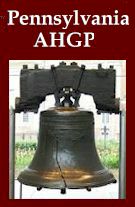State House ~ Government
State House
In the early days of Pennsylvania History, her Legislature held
their Sessions in private houses; the first place occupied for
that purpose, was situated in Front Street, above Mulberry
Street, on the bank side; and for many years a house, situated
in Front Street, below Walnut was occupied for the same purpose.
In 1739, the Legislature resolved to build, for their particular
accommodation, the present venerable Structure, situated on the
south side of Chesnut Street, between Fifth and Sixth Streets,
and appointed Commissioners, to purchase the ground, and execute
the design of the assembly, which was completed in 1735, at a
cost of Six Thousand Pounds, Pennsylvania currency?
It was originally ornamented with a Steeple, which haying
decayed, was removed, about the close of the Revolutionary War;
and the base of the steeple continued to present to view, the
naked tower, until 1828, when the present steeple was erected,
after the design of the original structure.
In this building the Congress of the United States (when
Philadelphia was not in possession of the English) sat, during
the war of the revolution, up to 1782, at which time, a few
soldiers becoming clamorous for their pay, it was deemed prudent
to sit in another place. Congress sat in the East Room of the
first story, recently restored to its primitive appearance, and
ornamented with a Statue, Of The Father Of His Country: In this
Room the Declaration Of Independence was passed, on the 4th of
July, 1776, (afterwards proclaimed, from the State House steps)
and the Convention, that formed the Constitution Of The United
States, held their Sessions, in 1787. The Political Association,
which will be excited by this Hall, will swell every Patriotic
Hearty and the glorious prospects of this country, and the
influence that she will exert, on the nations of the earth, will
be referred to transactions within its venerated Walls. The West
Room on the same floor, is now occupied for the Sessions of the
Mayor's Court; and the rooms formerly occupied by Peale's
Museum, in the Second story, are now used for the sittings of
the District and Circuit Courts of the United States.
In the steeple is placed a superior Clock, made by Mr. Lukens,
which indicates the Time, with accuracy, and records it, on a
"Ground Glass Dial, capable of being illuminated at night. The
hours are struck on a very heavy Bell, fixed in the steeple,
which is also used, to indicate the existence and direction of
Fires, to ascertain which, and give the Alarm, a Watchman is
always in the steeple.
The following arrangement is employed, to give intelligence to
the citizens, of the Direction of Fires.
Regulations of the State House Bell
When the fire is in the vicinity of the State House, the Bell is
struck rapidly, without any distinct intermission. When North of
te State House, One blow is given, with a distinct pause,
between each repetition. When South, Two blows are given. When
East, Three. When West, Four. When tho Fire is Northeast, One
blow is given, followed by a distinct pause, then Three blows,
in quick succession. When Northwest, One Four. When Southeast,
Two, Three. When Southwest, Two Four.
Besides, the BELL employed for the foregoing purposes, the old
bell, east purposely for the edifice, when first erected, is
carefully preserved in the tower of the steeple. This Bell was
cast, many years before the Declaration of Independence, and
bears upon it the following inscription, Prophetic of Its Use,
To Announce That Imperishable Manifesto! Proclaim Liberty,
throughout this Land, unto all the inhabitants thereof."
Leviticus, XXV. chap. v. 10
Offices of The Courts
On each side of the State House is erected, buildings of two
stories in height, having the appearance of wings to the main
building; these are occupied, (even to the cellars) as Offices
for Law Courts, and Depositories for the Records, and Documents,
in relation to the County of Philadelphia: Their crowded
condition, as well as the inadequate accommodation, which the
Court of Law now have, indicate the necessity, of a speedy
erection of new Court Houses, Offices of Courts &c.
County Court House
On the Southwest corner of Independence Square is erected, a
brick building, two stories in height, intended for the County,
District, Criminal, Oyer and Terminer, and Supreme Courts, of
Pennsylvania. It has two Court Rooms in each story, and contains
also a room, for the use of the Law Library, of the gentlemen of
the Philadelphia Bar.
Council Chambers, Mayor's Offices, &c
On the Northeast corner of Independence Square is situated, the
building designed to accommodate the City Councils, the Mayor,
Police Officers, and other Functionaries, connected with the
administration of the City Government. This building, as well as
that on the opposite corner, is ornamented with a cupola and
vane, and immediately in its rear, on Fifth Street, is erected
the Hall of the American Philosophical Society, now occupied by
the Athenaeum, and that Institution.
Independence Square
Immediately south of the Old State House, on which it fronts,
stands Independence Square, so named, in consequence of the
Declaration having been (publicly) made from the steps of the
State House. This Square is laid out in straight, and serpentine
walks; and greatly improved, with many valuable, and ornamental,
aged, and young Trees, in a state of good preservation. It is
laid out in grass-plats, and surrounded by an iron railing, with
principal entrances, with marble gate posts, on Walnut and
Chesnut Streets.
rom the Steeple of the State House, interesting (Panoramic)
Views of the City, Public Squares, River Delaware, and beautiful
scenery, of the surrounding country, hare been taken, and
published by Mr. J. T. Bowen, at his Lithographic press, in
Walnut Street, near Fourth.
History of Philadelphia

|
![]()

![]()
